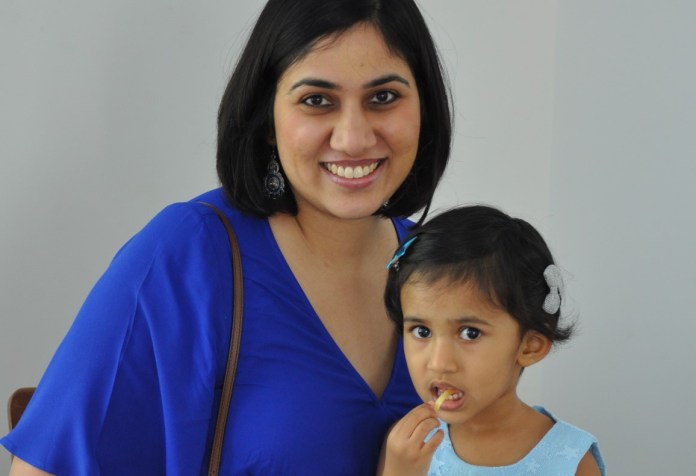For all the new parents out there, we know how overwhelming the entire situation can get at times. You have the responsibility of a whole new human being, and you have to be on your A-game. 24X7. That too, with barely any sleep! So, we spoke to the founders of India’s India’s biggest Facebook group on baby sleep, “Gentle Baby Sleep India”. It’s a support group for parents aimed at fostering gentle, no-cry methods to inculcate healthy sleeping habits in babies and toddlers.
Himani Dalmia, the founder of the group is the scion of the Dalmia Group of Industries. Himani, who is now a fully dedicated mom, after having learned from her own experiences, runs this successful Facebook group along with other co-admins. These ladies have equipped themselves with enough knowledge to help new parents, especially mothers, who are struggling with their baby’s sleep with evidence-based information. Read on to know more!
So Himani, first of all, tell us about the Gentle Baby Sleep India group which you started?

Himani Dalmia: When my baby turned 4 months old, I began to read books and articles about baby sleep. I was trying to find a way to deal with the seemingly endless sleepless nights that came with having a newborn. I noticed that there was no group on social media dedicated explicitly to baby sleep, even though sleep is as essential as food for a baby. I, along with my former schoolmate, Neha Bhatt, approached a couple of other mums who we had seen commenting knowledgeably about sleep on other groups and launched Gentle Baby Sleep India in February 2016.
GBSI now has 20,000 members, 8 admins and 4 peer counsellors. It is a peer support group that is open to all parents of children aged 0-5 years anywhere in the world, although the context remains Indian. Due to the controversial and myth-infested nature of the subject, the group is heavily moderated. The pillars of our philosophy are evidence-based and child-led.
“My baby doesn’t sleep through the night”- This is one of the most common concerns of the mothers these days. Is it is normal for babies to wake multiple times at night?

Lakshmi Rammohan: The common misconception that babies are meant to sleep through the night is totally baseless. Adults themselves wake multiple times through the night. The only difference between an adult waking & a baby waking is the ability of an adult to bridge sleep cycles which a baby achieves only much later, as a toddler.
In newborn infants, multiple wakings are in fact a survival instinct. Outside of the womb, disconnected from their erstwhile secure environment that automatically provided for their every need, they MUST react to their new environment, react to sensations of hunger, thirst, discomfort, cold, heat and so on. Additionally, their circadian rhythm develops only around the 12 to 16-week mark which means they don’t distinguish between night & day until then.
What do you think about co-sleeping or bed-sharing with babies? More and more women are getting concerned about SIDS and the need for babies to sleep on their own.

Ramneek Nitesh Gupta: Majority of the leading health organisations for children recommend co-sleeping till at least 6-12 months. Bed sharing is a controversial practice in the West. In our country, it has been followed since time immemorial. Bed-sharing or co-sleeping has a lot of advantages. The prime being that the babies get the touch and closeness of the main caregivers which they require. Most parents do note that children sleep better when close to them. For a breastfeeding mom, it is much easier if the baby is right next to her. It helps the parent respond quicker to the baby.
A lot of women believe that feeding babies formula will let them sleep better at night. Is this true?

Ramneek Nitesh Gupta: Formula can be heavier for the baby to digest in comparison to breastmilk. It can sometimes lead to longer hours of sleep at night for very young infants. Even then, for most babies, the heaviness of formula can actually cause stomach troubles like gas which can negatively hamper sleep. While heavier food can make you sleepy in the start, it can also cause stomach distress. In fact, breastmilk contains the sleep hormone melatonin, which induces sleep.
How does the sleep pattern for babies change as the baby grows up?

Himani Dhaundiyal: Sleep undergoes a lot of changes in the first 3 years of a baby’s life.
Newborns need to sleep 18-20 hours a day, and cannot stay awake for more than 30 mins at a time. Typical newborn behaviour is cluster feeding and taking cat naps in the evenings, and then going to sleep for a relatively long stretch past midnight.
4 months – It is marked by a sleep regression which is a turning point in how babies sleep. Around this time, parents can observe a rough sleep pattern emerging. This is the ideal time to introduce a bedtime routine. Another major change that happens around this time is that babies become much more aware of their surroundings. What this means is that they are very easily distracted and would now need to be put to sleep in a pitch dark and quiet room. If breastfeeding, offering to nurse as soon as they stir is extremely helpful too. At this age, babies need 4-5 naps.
6 months – Babies undergo a sleep regression again. At this age, they take 3 naps totalling around 4 hours.
8-10 months – Again there is a major sleep regression which is usually caused due to multiple reasons like for teething, baby trying to sit up, crawl etc. At 8 months, babies drop to 2 naps.
12 months – There is a sleep regression again. Babies start resisting one of the naps and parents feel that they are transitioning to one nap. Most babies continue being on 2 naps till 15-21 months, and then they drop to one nap. Children finally drop the last nap between 3-5 years of age. We highly recommend giving some quiet time during the day to replace the nap.

What are some of the books you suggest for parents-to-be and parents to be more informed?

Himani Dalmia: There are so many books out there and some propagate dangerous misinformation with catchy titles and smart writing. We recommend the following:
- The Gentle Sleep Book by Sarah Ockwell-Smith
- The No-Cry Sleep Solution by Elizabeth Pantley
- Kiss Me by Carlos Gonzalez
- Peaceful Parent, Happy Kids & Peaceful Parent, Happy Siblings by Laura Markham
- The Womanly Art of Breastfeeding & Sweet Sleep by the La Leche League
- Toddlercalm by Sarah Ockwell-Smith

What are some of the common practices your group feels need to change in India?

Neha Bhatt: There are many parents and grandparents who believe babies should be able to sleep on their own from day one. Or continue to sleep for hours together when put down on the bed because they are born with the ability to self soothe. The truth is that babies cannot sleep alone for long and need a lot of physical contact and 24/7 care.
Another myth is that feeding to sleep is a “bad habit”. So often caregivers put babies to sleep in a traditional swing (also called thooli or godiyu) which is not safe at all, especially once a baby can rollover. People also expect babies to sleep through the night without waking up for feeds or any comforting so they force-feed them heavy food before.

Another common practice which needs to be addressed is that many people don’t let babies nap in the day so they get exhausted and can sleep well at night. In reality, babies have a certain natural body rhythm where they need age-appropriate naps for proper growth, which helps them sleep better at night and babies also need a quiet, dark, safe space to sleep just like adults do.
The western sleep training industry promotes self-soothing and cry-it-out method, which is starting to become known in India as well. What is your group’s approach to this?

Nidhi Doshi: Our group promotes safe and gentle baby sleep practices that are backed by scientific research. Unfortunately, a lot of popular sleep training methods such as promoting self-soothing, using partial or complete cry it out is proven to increase stress levels in young babies, the effects of which can be several kinds of stress and anxiety disorders as babies grow up. Sometimes these can continue all the way up to adolescence and can have a lasting impact on the individual’s personality.
Western research institutes have identified and acknowledged the benefits of attachment parenting and are making efforts to implement this right from the child’s birth where the baby and mother co-sleep. Nursing the baby to sleep is encouraged and support is provided through lactation experts.
A baby has a natural instinct to seek comfort and security from the parent. We encourage parents to attune themselves to this instinct and understand that sleeping long stretches is a developmental milestone much like walking, talking etc. It happens in due course of time when the baby is ready for it and not an overnight process that can be achieved by training an infant using harsh sleep training methods.
That sounds so informative! So, all you young mommies & daddies out there, we hope you learnt a great deal about your tiny tot’s sleep and much more from this conversation.




